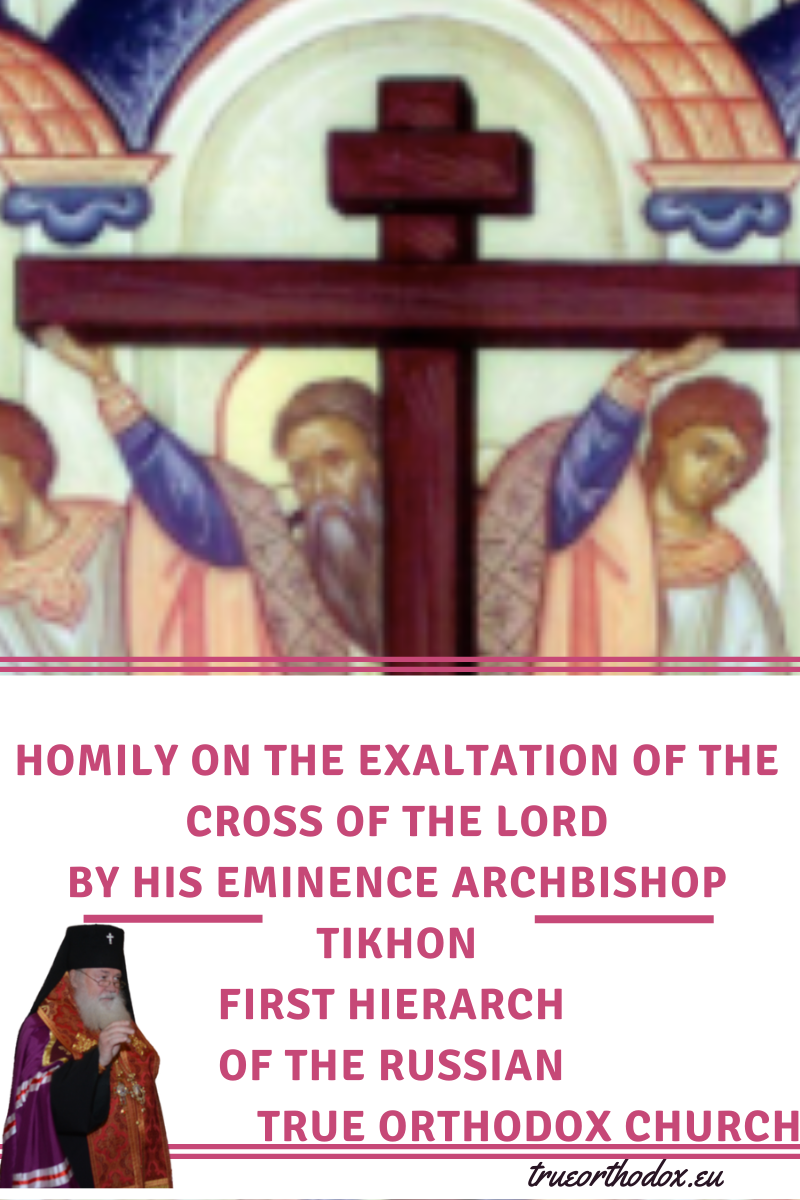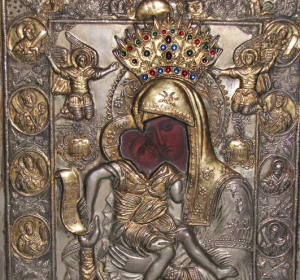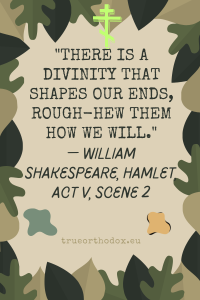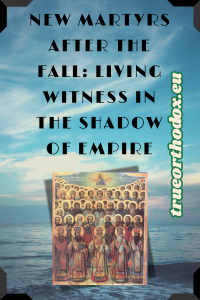HOMILY ON THE EXALTATION OF THE CROSS OF THE LORD

BY HIS EMINENCE ARCHBISHOP TIKHON, FIRST HIERARCH OF THE RUSSIAN TRUE ORTHODOX CHURCH
2021, Omsk, Siberia
In the name of the Father, and of the Son, and of the Holy Spirit.
Today, on the day of the feast of the Exaltation of the Holy and Life-Giving Cross of the Lord, let us once again draw our attention to this great event that we remember together with the Church, because we need to know everything about the great work of our redemption, we need to have our faith in the Savior tested, because only those who believe in Him and confirm their faith by deeds will have eternal life. Our forefathers had sinned grievously, and for this crime all their offspring, as infected with sin, were inevitably condemned to death.
Damaged human nature was no longer able to defeat evil on its own. But the merciful God Who created man could not allow His creation to perish so ingloriously. For the re-creation of man, He sent His Only Begotten Son into the world, who endured death on the cross and thereby enabled man to enter into communion with God again. Everything has been done for us so that we do not perish from eternal life, but do we ourselves strive to reap the benefits of the Savior’s death on the cross? Unfortunately, we can’t always answer this question in the affirmative.
The crucifixion of our Lord Jesus Christ on the Cross made the Cross the highest Divine Altar, on which the all-world reconciliatory sacrifice was offered to God the Father; On It, the Only Begotten Son of God, Jesus Christ, suffered superhuman sufferings, bled out His Divine Blood, and gave up His Spirit for the sins of the whole world.
Since then, the Cross of Christ has acquired the highest significance and divine power in the Church of Christ. And if we look closely at the life of the Church, we will see that everything in Her is connected with the Cross. Indeed, the Orthodox Church builds its temples in the likeness of a Cross, placing It in their foundation, and crowning their domes with It. All of the sacred objects intended for divine service in the Church, the Divine Mysteries themselves, performed in Her by the grace of the Holy Spirit, and all other sacred rites of the services and prayers of the Church – all of these are sealed, blessed and sanctified by the sign of the Life-giving Cross of the Lord.
The Holy Church commands all of us, Her children, to always protect ourselves with the sign of the Cross. Therefore, we bless ourselves, our loved ones, each other, and sanctify our entrances and exits, our homes, food and drink with the sign of the Cross. In a word, not only all our deeds and objects, but we also seal, bless and sanctify our thoughts with the sign of the Cross of Christ, for It is an irresistible and most terrible weapon against our visible and invisible enemies. It enlightens and strengthens our mind in piety, sanctifies the desires of our heart, and at the same time shatters and annihilates all of the slanders and machinations of our enemy – the devil – “he trembles and shakes, unable to bear to look at His power” – as is sung in one of the verses to the Honorable Cross. This is what great significance and effect the Cross contains for us at every step of our life. But without faith and reverence, one cannot utilise the power of the Cross and use it as a weapon, for this is the weapon of the holy truth of Christ. The enemies of the Cross are the enemies of Christ, and therefore our enemies. At the same time, we should not fall into error with respect to the commandment to love our enemies, for personal enemies are one thing, and enemies of Christ and the Church are another thing altogether, and the commandment to love our enemies does not at all mean agreement with their lies and their shamelessness.
I must draw your attention to the fact that the matter of our salvation by the death of the Savior on the cross is the main dogmatic concern of our Orthodox faith. We, as Orthodox Christians, must think and speak correctly about all the dogmas of the faith, and even more so about the most important of them – the dogma of our salvation. The main idea of this dogma is that no man, not one righteous man of the Old Testament, up to John the Baptist could free themselves from the curse that separated man from communion with God, and all of its associated disastrous consequences both in temporal life and in the future life to come. And only after the Savior’s reconciling death on the cross was free entry into the Heavenly Kingdom of the Lord for communion with Him opened for them, for there was no barrier – the curse, having been destroyed on the Cross along with its cause; ancestral sin.
The Son of God, Jesus Christ took human flesh under the law of death, therefore He had to destroy this law in human nature itself, to overcome death itself, which was accomplished through His Resurrection. But in order to be resurrected, the God-man had to first die, and moreover, on the Cross, in order to redeem us from the curse by His death. This is the brief testimony of St. Athanasius the Great about the necessity of Christ’s death on the cross to save us from eternal death.
The words of today’s Gospel spoken by the Savior: If anyone is willing to come after Me, let him deny himself, and take up his cross, and keep on following Me (St. Matthew 16:24) – we must properly receive and fulfill in life.
How can we correctly understand these words – to deny ourselves, take up our cross and follow Christ? To reject oneself means to reject one’s own sinful will, one’s evil habits, inclinations and passions, in a word – every sin that lives in us acts, darkens, and prevents us from following Christ into heaven, perverting our nature and making us slaves to corruption and death. This means that each of us must, with obedience to the will of God and gratitude to Him, endure precisely those sorrows and hardships that Divine Providence will allow us, and not any others imagined and assumed by our proud dreams.
And the rejection of oneself and the bearing of the cross begins with a continuous struggle with sin, which has entangled a man, holding him like prey in its claws. This is a struggle to the point of blood, a kind of martyrdom, when after each of our falls, moral anguish and remorse cause tears of repentance and we, in the consciousness of our guilt and weakness, again and again stretch out our hands with prayer to the One who said: The things impossible with men are possible with God (St. Luke 18:27). But besides this cross – the cross of fallen man, the Lord gives us another cross to bear – the cross of tests of our faith, the cross of various tribulations and hardships, with which we are tempted by the modern world. We must especially prepare ourselves for these in these last times.
And what does it mean – ‘to save your life [and lose it]’ (St.Matthew 16:25)? It means not to touch the passions of the soul, to leave them alone, to let them live and grow stronger, to control our mind, heart, and will – in other words, to control our soul and body; it means to live unrepentantly, without thought of death and eternal judgment. To care for yourself in this way means to destroy your soul forever, to lose it.
The words of the Lord: whosoever will save his life shall lose it, they are fulfilled around us every day. We are sold daily to our enemy by all kinds of sins living and acting in us; we die spiritually every day, and oh, if only we would rise up every day, and be revived for God through tearful repentance! Nay, your iniquities separate between you and God (Esias 59:2). They can separate us forever, if we don’t turn and repent from the bottom of our hearts. But let us recall the examples of many sinners who have become saints: Peter the Publican, Mary of Egypt, Eudokia, and others; look at the examples of saints in general, how they resolutely and irrevocably entered into a struggle with sin, with passions, with the devil; how sincerely they loved God and His truth, and having renounced carnal life for Christ and the Gospel, they saved their souls for eternity. Why do we not have a determined struggle against sin? Because we love the temporal life so much, we are afraid to upset the flesh, we are afraid of strong temptations, we love the world and its benefits to an extreme, forgetting about the inevitability of death and the transition to a new life; we plan to live for many years in unchanging prosperity; and in the pursuit of sensual pleasures we forget the divine nobility of our soul, its destination of immortality and eternal bliss; we forget that it is infinitely more valuable than the whole world with all its treasures, which, like a shadow, will pass. In rebuking this insane behavior of ours, the Lord says: For what is a man profited, if he should gain the whole world, and lose his soul? Or what shall a man give as an exchange for his soul (St. Matthew 16:26)?
Therefore, we must be very careful and strict with our personal piety, which confirms our belonging to Orthodoxy.
And today, bowing before the Honorable and Life-Giving Cross, we will pray to the Lord that He will give us strength, constancy, patience and perseverance in all kinds of temptations, which are becoming more and more each year. We need this help from the Lord in order to carry our cross to the end, so that in the future life we can praise the Lord forever, and enjoy His incomparable beauty and kindness, for He is the King of Glory and the Lord of the whole world.
Let us hasten to worship the Cross, for only by standing at the Cross of the Lord can we understand God, see the path to salvation drawn for us by the Provider, and love Christ. Sin, which separates us from God, is condemned and defeated on the Cross; Love shone from the Cross, uniting us with God. And the Cross calls us to love the Crucified Jesus Christ, and through Him to love each other.
And we will constantly raise our prayers to the Lord so that He spiritually strengthens us and grants us the capacity to always remain unshaken in the Orthodox faith, so that Divine grace with its wonderful fruits – truth and love, joy and peace – will always be with us. So that after the transition from this temporary life into eternity, we would be honored to share the fate of the Angels and all the Saints who have pleased God from time immemorial.
Merciful Lord, by the invincible Divine power of Thy Honorable and Life-giving Cross, save and preserve us all!
AMEN.
++++++++++++
На Воздвижение Креста Господня – 2021, Омск
Во имя Отца, и Сына, и Святаго Духа.
Сегодня, в день праздника Воздвижения Честнаго и Животворящего Креста Господня, обратим еще раз наше внимание на это великое событие, которое мы вспоминаем вместе с Церковью, ибо нам необходимо знать всё о великом деле нашего искупления, нам надо испытать свою веру в Спасителя, ибо только верующий в Него и подтверждающий веру своими делами будет иметь жизнь вечную. Наши прародители тяжко согрешили и за это их преступление всё потомство, как зараженное грехом, неминуемо осуждалось на гибель.
Поврежденная человеческая природа уже не в силах была сама победить зло. Но премилосердный Бог, создавший человека, не мог допустить, чтобы Его творение так безславно погибло. Для возсоздания человека Он послал в мiр Сына Своего Единородного, Который претерпел крестную смерть и этим самым дал возможность человеку опять войти в общение с Богом. Для нас сделано всё, чтобы мы не погибли для жизни вечной, но стремимся ли мы сами к тому, чтобы воспользоваться плодами крестной смерти Спасителя? К сожалению, мы не всегда можем утвердительно ответить на этот вопрос.
Распятие на Кресте Господа нашего Иисуса Христа сделало Крест высочайшим Божественным Жертвенником, на котором была принесена всемiрная умилостивительная жертва Богу Отцу; на Нём претерпел нечеловеческие страдания, источил Свою Божественную Кровь и испустил Дух Свой за грехи всего мiра Единородный Сын Божий Иисус Христос.
С тех пор Крест Христов получил высочайшее значение и Божественную силу в Церкви Христовой. И если мы всмотримся в жизнь Церкви, то увидим, что в Ней всё связано с Крестом. Действительно, и храмы свои Церковь Православная сооружает по подобию Креста, полагая Его в основание их, и им же венчает их возглавия – купола. Все священные предметы, предназначенные в Церкви для богослужения, сами Божественные Тайны, совершаемые в Ней благодатью Духа Святаго, и все другие священнодействия служб и молитв церковных – всё это печталеется, благословляется и освящается знамением Животворящего Креста Господня.
Святая Церковь всем нам, своим чадам заповедует всегда ограждать себя знамением Креста. Поэтому мы благословляем как самих себя, так и близких наших, и друг друга, и освящаем входы и выходы наши, наши жилища, пищу и питие знамением Креста. Словом, не только все наши дела и предметы, но и помыслы наши мы печатлеем, благословляем и освящаем знамением Креста Христова, ибо Он есть неодолимое и самое страшное оружие на врагов наших видимых и невидимых. Он просвещает и укрепляет наш ум в благочестии, освящает желания нашего сердца, и в тоже время Он разрушает и уничтожает все наветы и козни врага нашего – диавола – «трепещет бо и трясется, не терпя взирати на силу Его» – как поется в одной из стихир Честному Кресту. Вот какое высокое значение и действие Крест содержит для нас на каждом шагу нашей жизни. Но без веры и благоговения нельзя пользоваться силою креста и употреблять его как оружие, ибо это есть оружие святой правды Христовой. Враги же Креста — враги Христовы, а значит и наши враги. При этом мы не должны впадать в ошибку в отношении заповеди о любви к врагам, ибо личные враги и враги Христа и Церкви – разные понятия, и заповедь о любви к врагам совершенно не означает согласия с их ложью, с их безстыдством.
Должен обратить ваше внимание на то, что вопрос о спасении нас крестною смертию Спасителя – есть основной догматический вопрос нашей Православной веры. Мы, как православные христиане, должны правильно мыслить и правильно говорить о всех догматах веры, а тем более о главнейшем из них – догмате о нашем спасении. Главная мысль этого догмата заключается в том, что никто из людей, ни один из ветхозаветных праведников, вплоть до Иоанна Крестителя, не мог освободиться от проклятия, которое отлучило человека от общения с Богом со всеми гибельными последствиями как во временной жизни, так и в будущей загробной. И только после крестной искупительной смерти Спасителя был открыт им свободный вход в Небесное Царство Господа для общения с Ним, ибо не стало преграды – клятвы, которая была уничтожена Кресте вместе с первородным грехом, как её причиною.
Сын Божий Иисус Христос воспринял человеческую плоть с законом смерти, поэтому Ему надо было в самом человеческом естестве уничтожить этот закон, победить самую смерть, что и совершилось через через Его Воскресение. Но чтобы воскреснуть, надо было Богочеловеку сначала умереть, и при том – на Кресте, чтобы Своею смертию искупить нас от клятвы. Так вкратце выглядит доказательство святителя Афанасия Великого о необходимости крестной смерти Христа для спасения нас от вечной смерти.
Слова сегодняшнего Евангелия, сказанные Спасителем: «Иже хощет по Мне ити, да отвержется себе, и возмет крест свой, и по Мне грядет» – мы должны правильно воспринимать и исполнять в жизни.
Как же нам правильно понимать эти слова – отвергнуть себя, взять свой крест и следовать за Христом? Отвергнуть себя, это значит – отвергнуться своей греховной воли, своих порочных привычек, наклонностей и страстей, словом сказать – всякого греха, в нас живущего, действующего, омрачающего, препятствующего идти за Христом на небо, извращающего нашу природу и делающего нас рабами тления и смерти. Это значит, что каждый из нас должен с покорностью воле Божией, с благодарностью Богу переносить именно те скорби и лишения, какие попустит нам Божественный Промысел, а не какие-либо другие, воображаемые и предполагаемые нашим гордостным мечтанием.
И начинается отвержение себя и несение креста с непрерывной борьбы с грехом, который опутал человека, держит его, как добычу в своих когтях. Это – борьба до крови, это – своего рода мученичество, когда после каждого нашего падения нравственная мука и угрызения совести вызывают слёзы раскаяния и мы, в сознании своей вины и немощи, снова и снова простираем свои руки с молитвою к Тому, Кто сказал: «невозможная человеку суть возможна Богу». Но кроме этого креста, – креста падшего человека, Господь дает нам понести и другой крест – крест испытаний нашей веры, крест различных скорбей и невзгод, которыми нас искушает современный мiр. К этому мы особенно должны готовить себя в эти последние времена.
А что значит – «сберечь душу свою»? Значит, не трогать страстей души, оставлять их в покое, давать им жить и крепнуть, и владеть нашими умом, сердцем, волей, другими слова владеть нашей душой и телом; жить нераскаянно, не помышляя о смерти и о суде вечном. Беречь себя таким образом значит – навечно погубить душу свою, терять её.
Слова Господа: кто хочет душу свою сберечь, тот потеряет ее, исполняются над нами всякий день. Мы ежедневно продаемся врагу нашему всеми родами грехов в нас живущих и действующих; ежедневно умираем духовно, и, о! если бы ежедневно же возставали, оживали для Бога чрез слезное покаяние! Ведь грехи наши разлучают нас временно от Господа (Ис. 59, 2). Они могут разлучить нас и на безконечные веки, если не обратимся и не раскаемся от всего сердца. Но вспомним примеры многих грешников, сделавшихся святыми: Петра мытаря, Марии Египетской, Евдокии и других; посмотрите вообще на примеры святых, как они решительно и безповоротно вступали в борьбу с грехом, со страстями, съ диаволом; как искренно возлюбили Бога и правду Его, и отрекшись от плотской жизни для Христа и Евангелия, — сберегли души свои на веки безконечные. От чего же нет у нас решительной борьбы с грехом? Мы очень любим жизнь привременную, боимся огорчать плоть, боимся искушений сильных, крайне любим мiр и его блага, забывая о неизбежности смерти и перехода в новую жизнь; разсчитываем жить долгие годы в неизменяемом благополучии; и в погоне за удовольствиями чувственными забываем божественное благородство своей души, предназначения её к безсмертию и вечному блаженству; забываем, что она безконечно дороже целаго мipa со всеми его сокровищами, которые, как тень, пройдут. Обличая такое безумное поведение наше, Господь говорит: какая польза человеку, если он приобретет весь мip, а душе своей повредит? Или какой выкуп даст человек за душу свою?
Поэтому мы должны очень внимательно и строго относиться к личному благочестию, которым подтверждается наша принадлежность к православию.
И сегодня, покланяясь перед Честным и Животворящим Крестом, будем молить Господа, чтобы Он дал нам силу, постоянство, терпение и стойкость в искушениях всякого рода, которых с каждым годом становится все больше и больше. Эта помощь от Господа нам нужна для того, чтобы донести свой крест до конца, чтобы в будущей жизни мы могли вечно славословить Господа, и наслаждаться ни с чем не сравнимой Его красотой и добротой, ибо Он есть Царь Славы и Господь всего мiра.
Поспешим же поклониться Кресту, ибо лишь стоя у Креста Господня мы можем понять Бога, увидеть начертанный нам Промыслителем путь ко спасению и возлюбить Христа. На Кресте осужден и побежден грех, нас от Бога отделяющий; с Креста воссияла Любовь, нас с Богом соединяющая. И зовет нас Крест к любви к Распятому Иисусу Христу, а через Него и к любви друг ко другу.
И будем постоянно возносить наши молитвы ко Господу, чтобы Он духовно укрепил нас и даровал нам возможность всегда пребывать неповрежденными в Православной вере, чтобы с нами всегда была Божественная благодать с её дивными плодами – правды и любви, радости и мира. Что бы после перехода из этой временной жизни в вечность мы сподобились разделить участь Ангелов и всех Святых, от века Богу угодивших.
Милосердный Господи, непобедимою Божественною силою Честнаго и Животворящего Креста Твоего, спаси и сохрани всех нас!
АМИНЬ.



